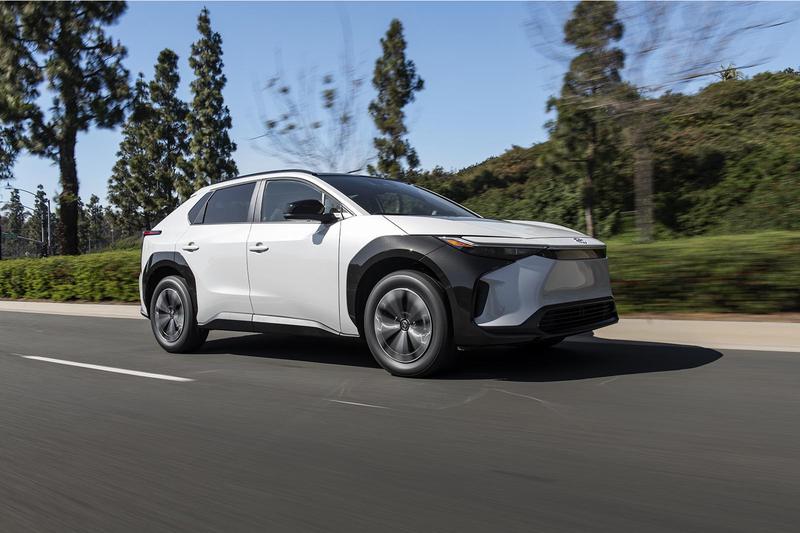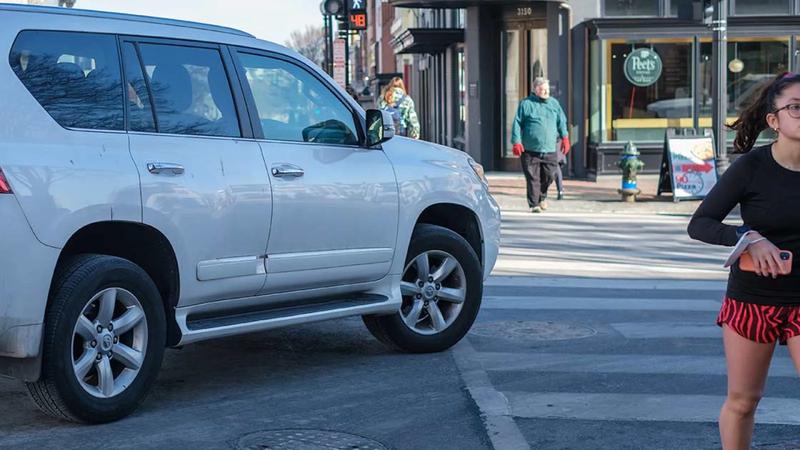While Toyota revolutionized the hybrid, it has lagged far behind with battery electric vehicles (BEVs). The 2023 bZ4X crossover will be its first and will start showing up at dealers later this month.
It’s been nearly a quarter-century since Toyota revolutionized the automotive world with the launch of the original Prius. But gone are the days when that hybrid was state-of-the-art technology.
If anything, Toyota now is playing catch-up as the rest of the industry races to electrify. The Japanese giant is finally ready to respond with the new bZ4X.
We headed out to California to drive the all-electric crossover SUV to see how it stacks up.
The Electric Revolution Is Upon Us
Not long ago, those looking for a battery-electric vehicle had few options to choose from, especially if they wanted more than 200 miles of range. But the numbers are growing fast and could hit as many as 60 by the end of this year, if automakers deliver on all the plans they’ve announced.
The number of brands bringing new BEVs to market is a virtual who’s-who, from Audi to Volkswagen — and even Vietnamese startup VinFast. Add Toyota to the list, the Japanese giant introducing the first of 15 models it will introduce over the next few years.
Dubbed the bZ4X, it goes on sale this month in two different trim packages and with a choice of either front- or all-wheel-drive. It even offers a bit of off-road chops, though you’re not going to take it out to Moab or the Rubicon Trail.
2023 Toyota bZ4X Electric SUV Review
The bZ4X name doesn’t roll easily off the tongue but it’s a shorthand that first stands for “beyond Zero,” Toyota’s electric brand-within-a-brand. The “4” is industry lingo representing its compact size. And the “X” means it’s offered with all-wheel-drive, at least as an option.
The 2023 Toyota bZ4X measures 185.6 inches in length, with a 112.2-inch wheelbase. It stands 65.0 inches in height, with a 73.2-inch width. Until recently, there wasn’t much action in the compact electric SUV segment — primarily the Tesla Model Y.
But the segment is getting crowded fast, with entries like the Ford Mustang Mach-E, the Hyundai Ioniq 5, the Kia EV6, and the Volkswagen ID.4. And there’ll be lots more coming.
As the numbers suggest — and our time behind the wheel validated — the Toyota bZ4X doesn’t necessarily excel in any specific category. It’s not the fastest or sportiest, nor does it have the longest range. It’s roomy, but doesn’t offer the most cargo or passenger space. It’s reasonably attractive, but doesn’t push the design envelope in any new direction.
But it does boast that Toyota badge. And that carries a promise of quality and reliability that could win over a wave of new buyers who, until now, have been cautious about making the switch from gas to electric.
The Toyota SUV follows the same basic rules as most of the new entries into the EV segment. That means it rides on a skateboard-like “architecture” placing batteries and motors below the load floor. The body itself places a premium on mileage-boosting aerodynamics.
The electric ute’s face adopts what Toyota designers have dubbed the “hammerhead look.” With no need for airflow under the hood, there is only a small grille under the bumper to cool the motors and battery pack. It has air curtain intakes at each corner to help reduce turbulence around the front wheels — which measure 18 inches with the base edition and 20 inches on the Limited.
If anything, the bZ4X features fewer of the quirky design details we see on other Toyota SUVs, something I personally find more attractive. There’s a subtle roll to the roofline that doesn’t impinge on rear-seat headroom like some competing battery SUVs. With the Limited model, Toyota also adds distinctive split high-mount spoilers.
The use of the skateboard chassis design has several practical advantages. It enhances handling by lowering a vehicle’s center of gravity.
Additionally, it lets product developers reclaim some of the space normally devoted to an engine compartment. With the bZ4X that translates into a class size-above interior with lots of cargo space.
The cabin is a clean affair with reasonably well-appointed detailing and again on the Limited power-heated and -cooled front seats. A luxurious feature, yes, but it also means you can stay warm or cool, as the season demands, while making less use of the SUV’s range-sucking climate control system.
The interior takes on a high-tech feel with its twin digital displays. But, as we’ve seen with competing models, that’s a mixed bag. A 12.3-inch infotainment system dominates the instrument panel and is large enough to make it easy to use. There are some conventional, manual controls — including a volume knob — but the touchscreen handles most everything you need.

What’s particularly impressive is Toyota’s new voice assistant. Like Amazon’s Alexa, it allows you to issue commands in plain English and can operate virtually everything in the vehicle.
Having already seen it work in new products from both Toyota and Lexus, I consider it one of the most successful efforts out there. It’s notably more accurate and responsive than the often-frustrating alternative from Mercedes-Benz, the MBUX.
Less impressive is the 7.0-inch digital gauge cluster. It is intended to be viewed from above, rather than through, the steering wheel. But among the many journalists who attended a recent drive event in San Diego, quite a few found that the wheel still tended to limit screen visibility.
As has become standard in the EV space, Toyota loaded up even the base version of the bZ4X with plenty of high-tech features, such as wireless charging, as well as wireless versions of Apple CarPlay and Android Auto. And smartphone-style over-the-air updates will allow the automaker to remotely send software updates — and even new features.
You’ll be able to remotely monitor the vehicle’s state of charge with a smartphone app, and control when it does charge up. That’s particularly useful if your local utility offers reduced-rate energy overnight.
The new bZ4X gets the latest Toyota Safety Sense 3.0 suite of advanced driver assistance systems, including blind-spot detection, rear cross-traffic alert, forward collision warning with automatic emergency braking, and more. The Limited model adds niceties like a surround-view 360-degree monitor.
Of course, what matters most is the drivetrain. Here, as well as when tuning the overall driving dynamics of the bZ4X, Toyota partnered with Subaru, the smaller Japanese automaker set to launch its own version of this vehicle, dubbed the Subaru Solterra.
Toyota’s electric SUV gives buyers four choices: base and Limited models available with either front- or all-wheel-drive systems.
The single-motor package hums out 201 horsepower, with the twin-motor model bumping that up to 214. It’s a surprisingly modest difference, but it’s not pony power that really delivers what battery-electric vehicles are becoming known for: that kick in the seat of the pants launch feel. There’s a more distinct difference, with the FWD version making a modest 196 pound-feet of torque, and the AWD model jumping to 248.
Driving along North San Diego County’s scenic Pacific Coast Highway, the added grunt was immediately obvious. And the Limited AWD added a modest thrill factor that was largely missing from the single-motor version.
It’s not to say that the front-drive model isn’t fun to drive, but it doesn’t really stand out in its class with a 0-60 time factor rated at 7.1 seconds. The all-wheel model is better, at 6.9 seconds, but still lags competitors like the EV6 and ID.4 — and never mind the real speed kings: the Tesla Model Y and Mustang Mach-E GT.
In terms of overall ride, the Toyota bZ4X is comfortable and largely soaks up what bumps we experienced rolling around San Diego. It handles corners with relatively little body roll. And it’s reasonably hushed; though, yet again, you’ll find a few competitors that are almost morgue-quiet.
One thing that may disappoint EV fans is the lack of a 1-Pedal mode. Electric vehicles extend range by recapturing energy lost during braking and coasting, and the bZ4X is no exception. A motorist can slightly increase the amount of regen with the touch of a button.
But, unlike the Mustang Mach-E and Kia EV6, you can’t amp that up to the point where you can handle most day-to-day driving by simply modulating the throttle. According to J.D. Power — and my own preferences — 1-Pedal mode is wildly popular with owners of vehicles offering this feature.
As has become another industry norm, Toyota offers drivers the ability to change modes, starting with basic Sport and Eco settings. Opt for all-wheel-drive, however, and you get three additional options, including Snow and Dirt, and Deep Snow and Mud.
During a recent European drive, Toyota showed off how the bZ4X could ford more than a foot of water and handle some actual off-roading — tests absent during our drive in San Diego.
It appears the new crossover actually can handle a bit of trail, though you’d be asking a bit much if you take it down any technical or rocky trails.
Its range is roughly mid-pack, with the 71.4kWh lithium-ion battery in the front-drive bZ4X yielding an EPA estimated 252 miles per charge. The pack in the AWD version is ever so slightly larger, at 72.8 kWh, but the added power drags the range down to an estimated 228 miles.
The automaker has yet to provide specific charging times, though it did announce that owners will have access to free charging for a year using public charging stations operated by EVgo.
As for plugging in at home, Toyota has lined up a number of partners, including ChargePoint, to make it easy to purchase and install a home charger. You’ll be able to go online to check what a charger costs to purchase and then install.
Speaking of cost, the 2023 Toyota bZ4X starts at $42,000 for the base XLE version in FWD. It climbs to $44,080 with AWD.
The 2023 Toyota bZ4X Limited, meanwhile, starts at $46,700 and will set you back at least $48,780 in its all-wheel-drive configuration. Add $1,215 in delivery fees to those numbers.
Here, Toyota is relatively mid-pack. The Hyundai Ioniq 5 starts at $39,950 before delivery fees, and the Mustang Mach-E starts at $43,895.
2023 Toyota bZ4X: A Lot to Like
The 2023 Toyota bZ4X features a lot to like, even if it doesn’t stand out from the crowd. It should be particularly easy for EV newbies to adapt to, and it’s likely to play well with those still skeptical about EV quality and reliability.
Look for the first of the electric SUVs to start rolling into showrooms this month, though the ongoing shortage of semiconductors could delay a full nationwide rollout in the U.S.




